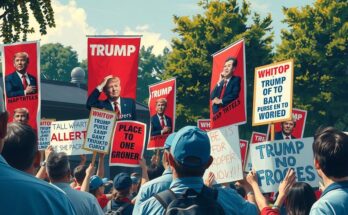In her critical review of Vincent Bevins’ book, Grace Blakeley highlights the grim reality of U.S. anti-communist policies that resulted in mass violence, particularly in Indonesia during the 1960s. The work unveils the staggering death toll caused by U.S. interventions and draws connections to further anti-leftist atrocities across the globe. Through survivor accounts and rigorous analysis, the book prompts a reevaluation of historical narratives related to socialism and capitalism, urging a remembrance of the impact of these violent histories on present and future political ideologies.
In her examination of Vincent Bevins’ latest work, “The Jakarta Method: Washington’s Anticommunist Crusade and the Mass Murder Program That Shaped Our World,” Grace Blakeley sheds light on the grim realities of America’s Cold War policies, particularly focusing on the catastrophic anti-communist massacres in Indonesia during 1965-66. This critical account uncovers how the United States, in its pursuit of capitalist expansion, engaged in orchestrated violence against perceived leftist threats across multiple nations, leading to an estimated half a million to one million deaths in Indonesia alone. Through survivor testimonials and extensive historical analysis, Bevins articulates the depth of American involvement and its ramifications on both Indonesian society and the broader geopolitical landscape. The narrative of the Indonesian genocide is woven into a larger tapestry of anti-communist violence, echoing across 22 countries worldwide, from Latin America to Southeast Asia. The book underscores the notion that the atrocities committed under the guise of anti-communism not only facilitated America’s victory in the Cold War but also inspired similar brutal regimes in various regions. Hence, the work serves as a pivotal reminder of capitalism’s darker historical implications, challenging the notion of ethical supremacy often associated with it, while confronting the collective amnesia surrounding these events in contemporary discourse. Blakeley poignantly illustrates that the historical discourse surrounding socialism often neglects the scale of violence perpetrated by capitalist regimes, thus calling for a reevaluation of the narratives that frame historical understandings of political ideologies. The sacrifices of those who resisted such violent oppression should be recognized and remembered, as they form a crucial part of the collective memory that shapes present-day political landscapes.
The article delves into the hidden atrocities committed by the United States during the Cold War under the pretext of fighting communism. It discusses how significant U.S. foreign policy decisions led to widespread violence against leftist movements across various nations, culminating in one of the most horrific massacres in Indonesia. This historical context informs the ongoing discussions about capitalism and socialism, particularly regarding the actions taken to suppress leftist ideologies. Blakeley’s critique also emphasizes the need for a deeper understanding of how these events have shaped modern political systems and ideologies, encouraging a discourse that acknowledges the complexities of historical narratives surrounding both socialism and capitalism.
Blakeley concludes that the systemic violence enacted in the name of capitalism, particularly during America’s Cold War endeavors, reveals a troubling historical legacy that is often overshadowed by contemporary discussions about socialism. By advocating for remembrance and recognition of these crimes, the need emerges for a nuanced understanding of political ideologies that transcends simplistic binaries. The legacy of the massacres in Indonesia and similar events worldwide urge us to reflect critically on the narrative structures that govern our interpretations of history, politics, and ideology.
Original Source: jacobin.com




